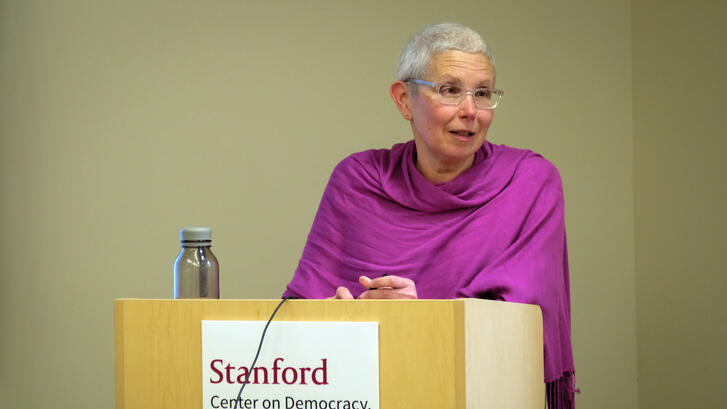Infrastructure, Campaign Finance, and the Rise of the Contracting State
Infrastructure, Campaign Finance, and the Rise of the Contracting State
Harvard University Professor of Government Alisha Holland explains how the advent of public-private partnerships has shifted politicians’ orientation toward infrastructure projects.

Why do politicians invest in infrastructure projects that will not be completed during their time in office? In a CDDRL seminar series talk, Harvard University Professor of Government Alisha Holland addressed the question, shedding light on how the advent of public-private partnerships (PPPs) has shifted politicians’ orientation toward infrastructure projects.
According to Holland, infrastructure investment has been on the rise in the developing world despite witnessing a steady decline in advanced industrial democracies. Why? The influx of PPPs has made infrastructure projects appealing to politicians, who have utilized such contracts to raise funds for electoral campaigns and delay project costs.
In the past, infrastructure projects were largely aimed at creating jobs for a given politician’s base of supporters and would-be voters. Thus, politicians were keen on seeing the successful completion of such projects. In contrast, today, infrastructure projects have become vehicles, not for securing votes, but for campaign finance, thanks to the PPP framework and the campaign donations it has helped generate for politicians, albeit indirectly. Thus, the mere launching of such projects (regardless of their completion) has become a political end in and of itself.
Infrastructure, Holland indicated, is at the heart of salient questions surrounding democracy, development, and state capacity. It also plays a central role in campaign finance in many developing democracies.
Conventional wisdom suggests that politicians want to inaugurate infrastructure projects that employ constituents and future voters. If true, politicians should be signing contracts for such projects early in their terms to allow time for job creation before reelection rolls around. But this does not appear to be the case. In Latin American countries where presidents can run for reelection, two-thirds of contracts occur in the last 18 months before an election.
Holland argued that this trend is rooted in governments’ shifting role in infrastructure. Whereas the state had long led infrastructure projects and hired directly with the goal of job creation, neoliberal reforms in the 1990s made governments rely more heavily on private contractors. Accordingly, the incentive structure facing politicians has changed. They have become less interested in creating jobs for supporters and more interested in securing campaign donations through the process of contracting private sector entities. The partnership with the private sector, moreover, has allowed politicians to hide project costs and shift liabilities to future administrations. The result is an influx of high-cost infrastructure projects with limited utility.
On a broader level, Holland’s findings help explain the widespread shift from political patronage to vote-buying in many countries. The advent of state-private sector partnerships has enabled politicians to raise the cash needed to fund vote-buying machines at a large scale.
How can the problem be mitigated? Much of the answer revolves around “inhibitory institutions.” These institutions could veto unwieldy projects before their commencement, as distinct from traditional mechanisms of horizontal accountability, like audit courts, which can only intervene after the damage is done.


